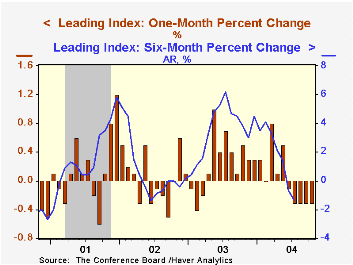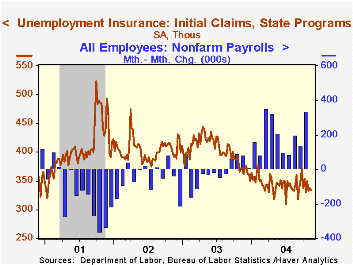 Global| Nov 18 2004
Global| Nov 18 2004Leading Indicators Down Again
by:Tom Moeller
|in:Economy in Brief
Summary
The October Composite Index of Leading Economic Indicators published by the Conference Board fell by 0.3% for the fourth consecutive month and marked the fifth month of decline. A 0.1% decline had been the Consensus expectation. Six- [...]

The October Composite Index of Leading Economic Indicators published by the Conference Board fell by 0.3% for the fourth consecutive month and marked the fifth month of decline. A 0.1% decline had been the Consensus expectation.
Six-month growth in the leaders of -1.4% was the weakest since mid-2002 and does not herald firm economic growth. Negative growth in excess of 2.5% preceded past periods when the US economy entered recession.
Three quarters of the 10 components of the leading index fell over a one month span with a narrower yield curve, lower consumer expectations and slower money supply growth providing the largest negative influences. Over a six month span 65% of the leaders fell.
The leading index is based on eight previously reported economic data series. Two series, orders for consumer goods and orders for capital goods, are estimated.
The coincident indicators rose 0.3% and the six-month growth rate held at 2.1%, down from the high of 3.3% early this year. During the last ten years there has been an 82% correlation between the six month growth in the coincident indicators and two quarter growth in real GDP.
The lagging indicators rose for the second consecutive month. The ratio of the coincident to the lagging indicators, a measure of how the economy is performing relative to its excesses, rose slightly but has moved sideways since the Spring.
Visit the Conference Board's site for coverage of leading indicator series from around the world.
"Monetary Policy and Inflation Dynamics" from the Federal Reserve Board can be found here.
"A Neutral Fed Funds Rate?" from the Federal Reserve Bank of St. Louis is available here.
| Business Cycle Indicators | Oct | Sept | 6-Month Chg | 2003 | 2002 | 2001 |
|---|---|---|---|---|---|---|
| Leading | -0.3% | -0.3% | -1.4% | 1.3% | 2.2% | -0.8% |
| Coincident | 0.3% | 0.1% | 2.1% | 0.4% | -0.5% | -0.5% |
| Lagging | 0.2% | 0.1% | 1.9% | -2.2% | -2.8% | -1.4% |
by Tom Moeller November 18, 2004

Last week, initial claims for unemployment insurance fell 3,000 to 334,000 from an upwardly revised 337,000 the prior week. The Consensus expectation had been for 333,000 claims and the federal government's closure in observance of the Veterans Day holiday during the week had no impact on the data.
The latest figure covers the survey period for November nonfarm payrolls and claims rose 4,000 (1.2%) from the October period.
The four week moving average of initial claims rose slightly to 338,250 (-9.4% y/y).
During the last ten years there has been a (negative) 73% correlation between the level of initial claims and the m/m change in payroll employment.
Continuing claims for unemployment insurance fell 16,000 following a downwardly revised gain of 15,000 the prior week.
The insured rate of unemployment remained at 2.2% for the sixth week.
| Unemployment Insurance (000s) | 11/13/04 | 11/06/04 | Y/Y | 2003 | 2002 | 2001 |
|---|---|---|---|---|---|---|
| Initial Claims | 334 | 337 | -10.0% | 402 | 404 | 406 |
| Continuing Claims | -- | 2,792 | -19.3% | 3,531 | 3,570 | 3,018 |
Tom Moeller
AuthorMore in Author Profile »Prior to joining Haver Analytics in 2000, Mr. Moeller worked as the Economist at Chancellor Capital Management from 1985 to 1999. There, he developed comprehensive economic forecasts and interpreted economic data for equity and fixed income portfolio managers. Also at Chancellor, Mr. Moeller worked as an equity analyst and was responsible for researching and rating companies in the economically sensitive automobile and housing industries for investment in Chancellor’s equity portfolio. Prior to joining Chancellor, Mr. Moeller was an Economist at Citibank from 1979 to 1984. He also analyzed pricing behavior in the metals industry for the Council on Wage and Price Stability in Washington, D.C. In 1999, Mr. Moeller received the award for most accurate forecast from the Forecasters' Club of New York. From 1990 to 1992 he was President of the New York Association for Business Economists. Mr. Moeller earned an M.B.A. in Finance from Fordham University, where he graduated in 1987. He holds a Bachelor of Arts in Economics from George Washington University.
More Economy in Brief
 Global| Feb 05 2026
Global| Feb 05 2026Charts of the Week: Balanced Policy, Resilient Data and AI Narratives
by:Andrew Cates






